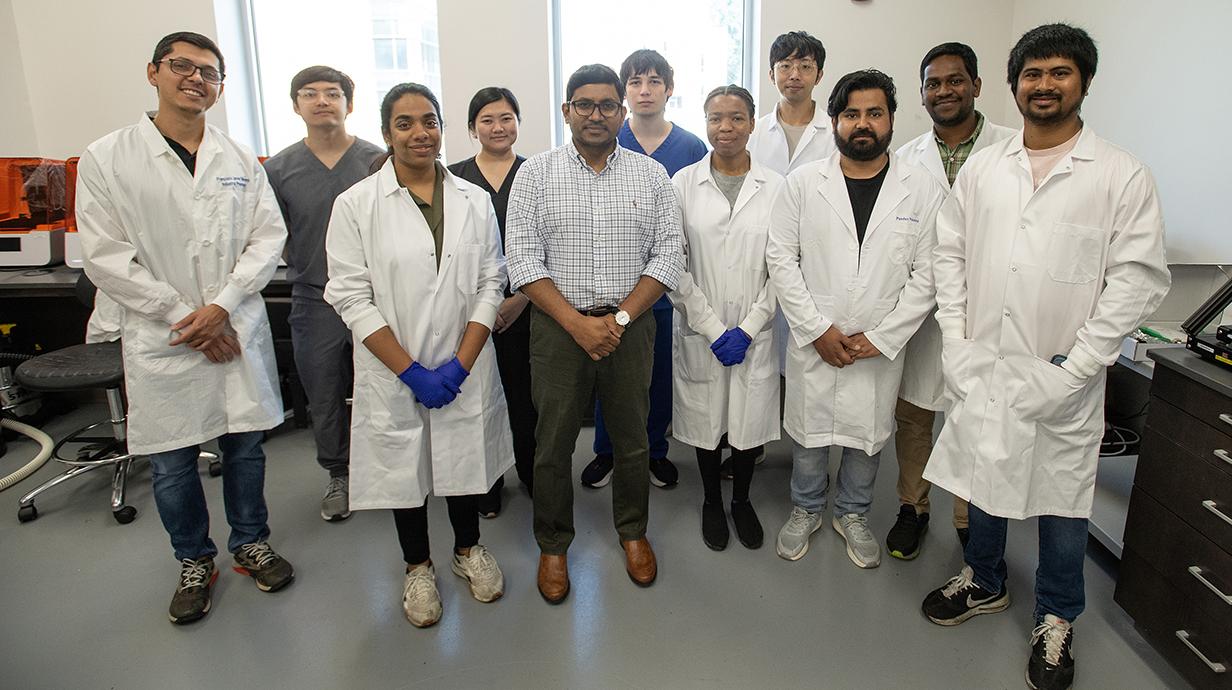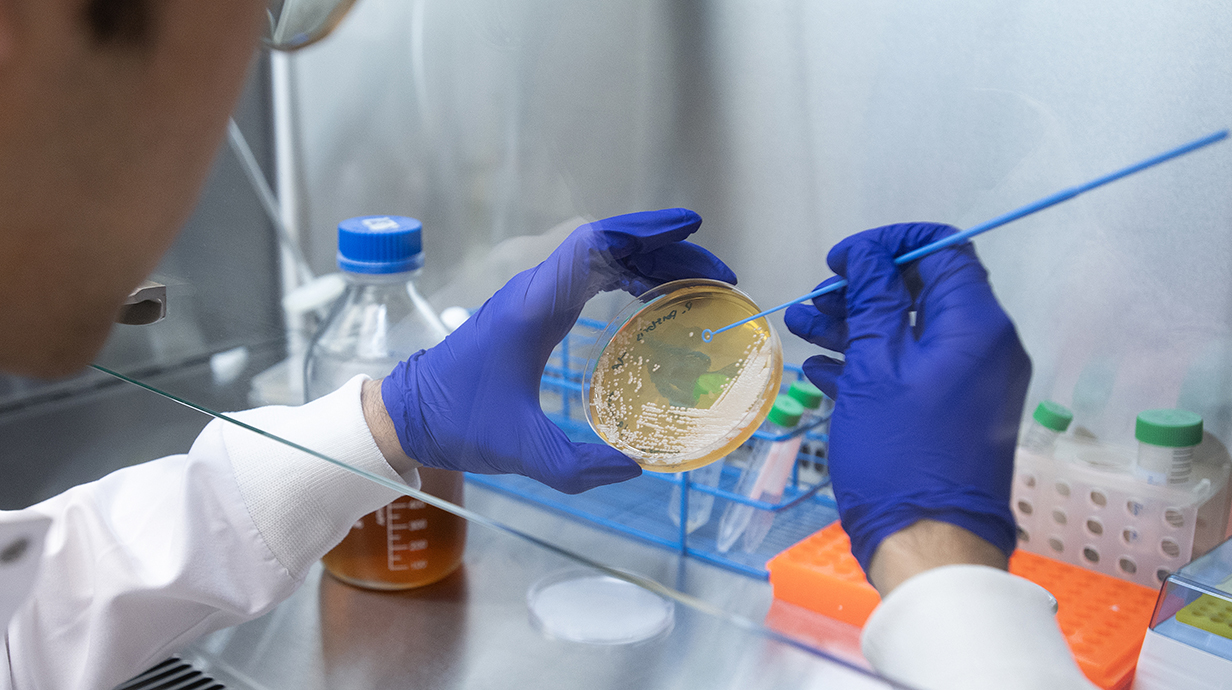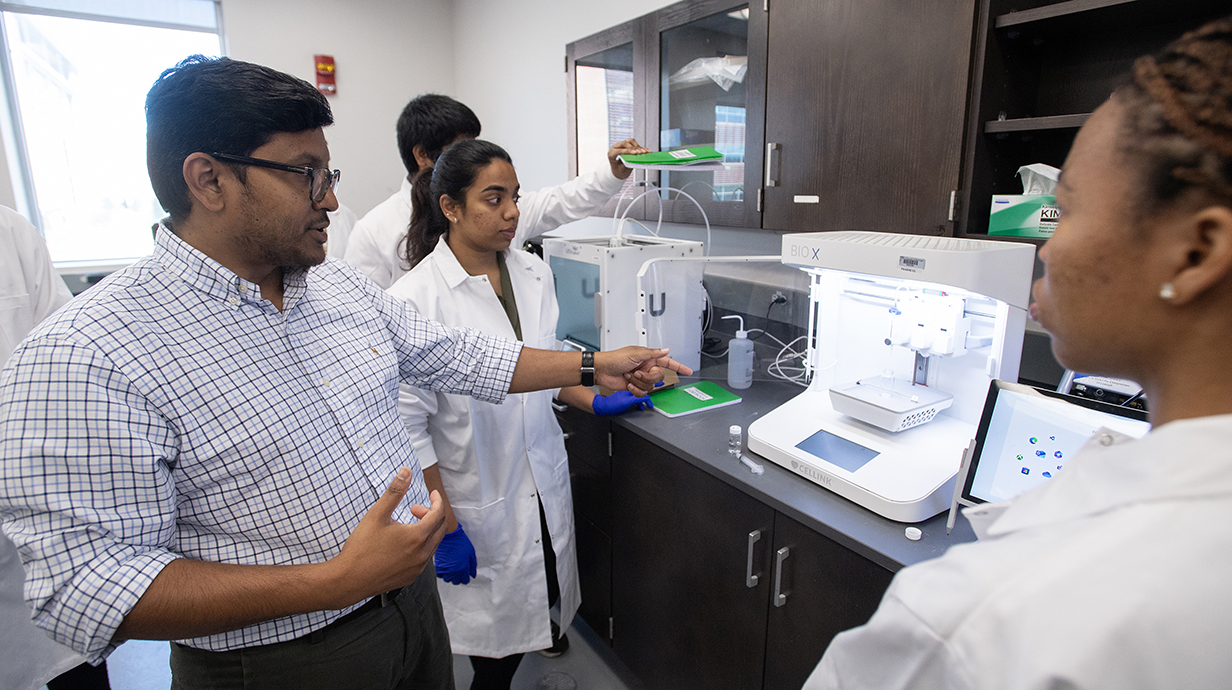Pharmacy Federal Grant to Propel Vaccine Technology Research
Researcher seeks to streamline vaccine manufacturing
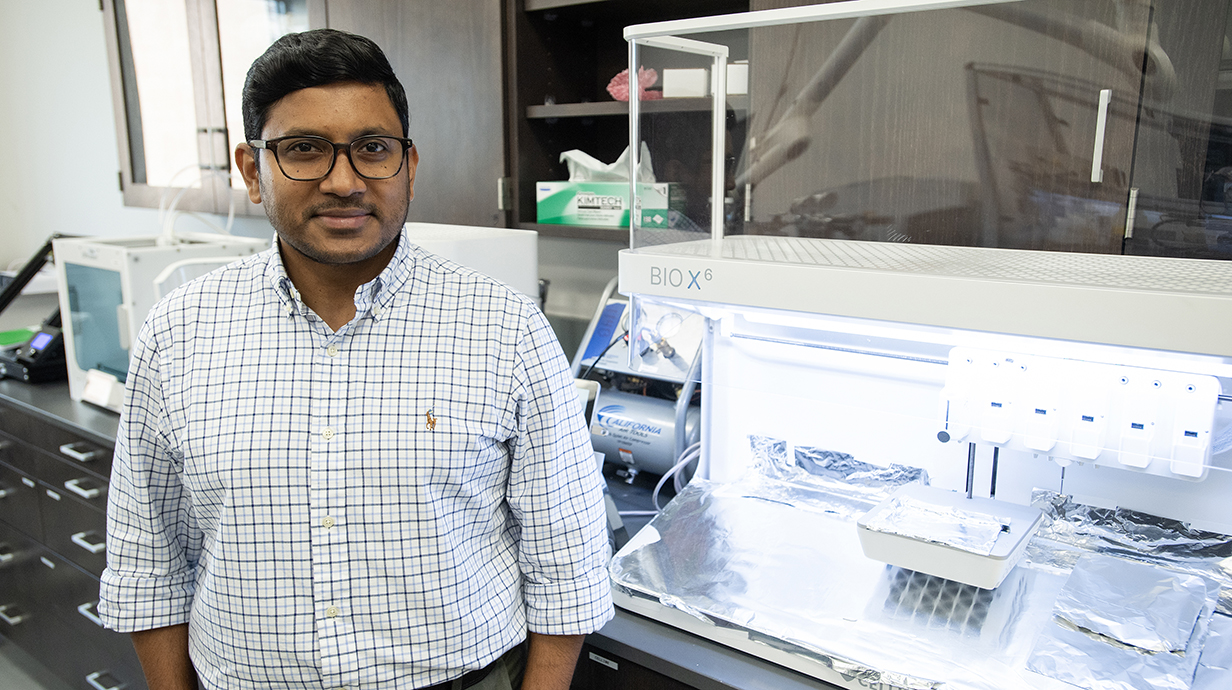
OXFORD, Miss. – The U.S. Food and Drug Administration has awarded some $500,000 to University of Mississippi pharmacy professor Mo Maniruzzaman, with a recommendation for another $500,000 in 2025, to develop a technology that promises to streamline vaccine production.
Maniruzzaman, chair of the UM Department of Pharmaceutics and Drug Delivery, will work with two doctoral students and two postdoctoral research fellows to develop a method for manufacturing complex vaccines made with special proteins, referred to as recombinant protein vaccines.
The team will use bacteria or yeast cells that have been engineered to produce recombinant protein vaccines. These proteins, such as hemagglutinin, can protect against the flu or other illnesses.
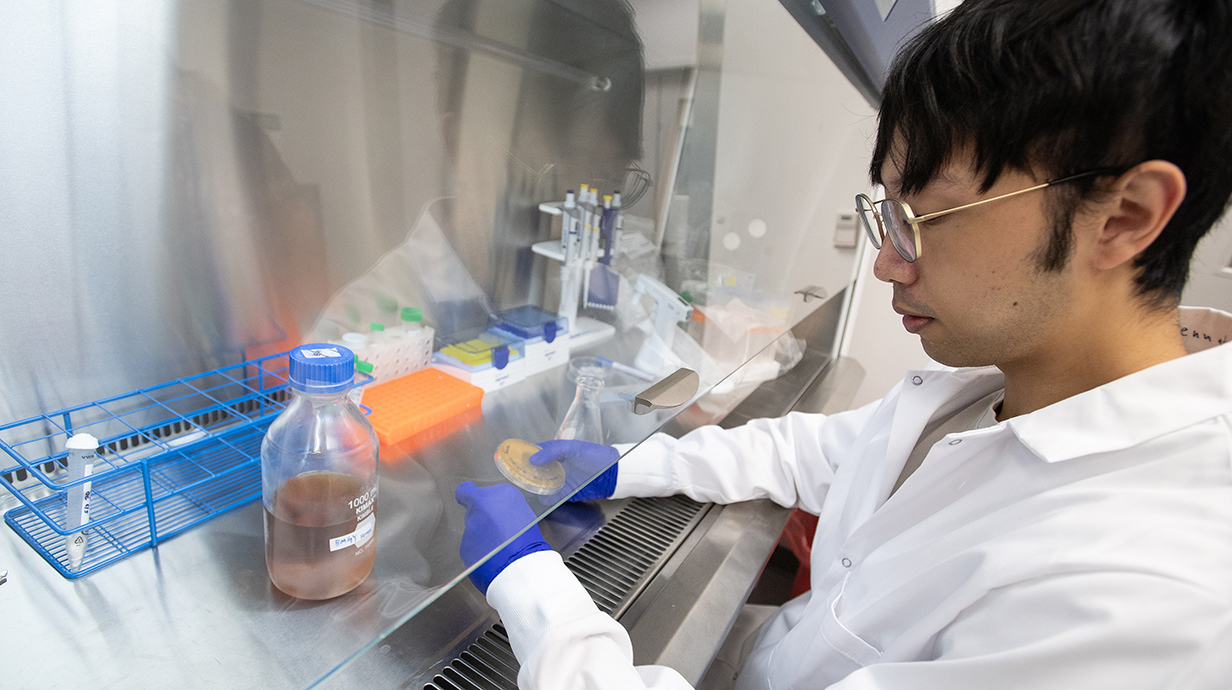
Shao 'Kenneth' Feng, a first-year doctoral student in pharmaceutical sciences, cultures bioengineered strains of yeast in a petri dish in Mo Maniruzzaman's laboratory in the Thad Cochran Research Center. These yeasts can produce recombinant protein vaccines on demand. Photo by Thomas Graning/Ole Miss Digital Imaging Services
"This technology will change the game when it comes to producing these protein vaccines on demand or at the point of service and is supported by a state-of-the-art approach – a step forward to the existing manufacturing techniques," Maniruzzaman said.
A more streamlined process such as this could, for example, drastically speed up the production of vaccines during flu season or enable the science community to respond more quickly to another pandemic.
Researchers have demonstrated that vaccines produced by these single-cell micro-organisms have great potential to protect against other emerging infectious diseases.
The technology for delivering the vaccine is called sprayed multi adsorbed-droplet reposing technology, or SMART, Maniruzzaman said.
"The need for efficient technology for manufacturing vaccines on demand and at the point of service has never been so pressing as in the midst of the recent pandemic outbreak," he said. "Our lab will broaden the scope of novel 3D printing technology, SMART to single-step manufacturing of biologics, including monoclonal antibodies and protein vaccines."
The biomanufacturing industry is overloaded with processes that are lengthy, expensive and lack flexibility, Maniruzzaman said. Once optimized, his method could be used in large-scale fermentations to produce recombinant protein vaccines on demand and much faster.
"Since COVID rates are predicted to be increasing and flu rates remain particularly high, we need better technologies and treatment mechanisms to highlight how these diseases and their emerging variants work," said Andrew Yockey, epidemiologist and assistant professor in the UM Department of Public Health.
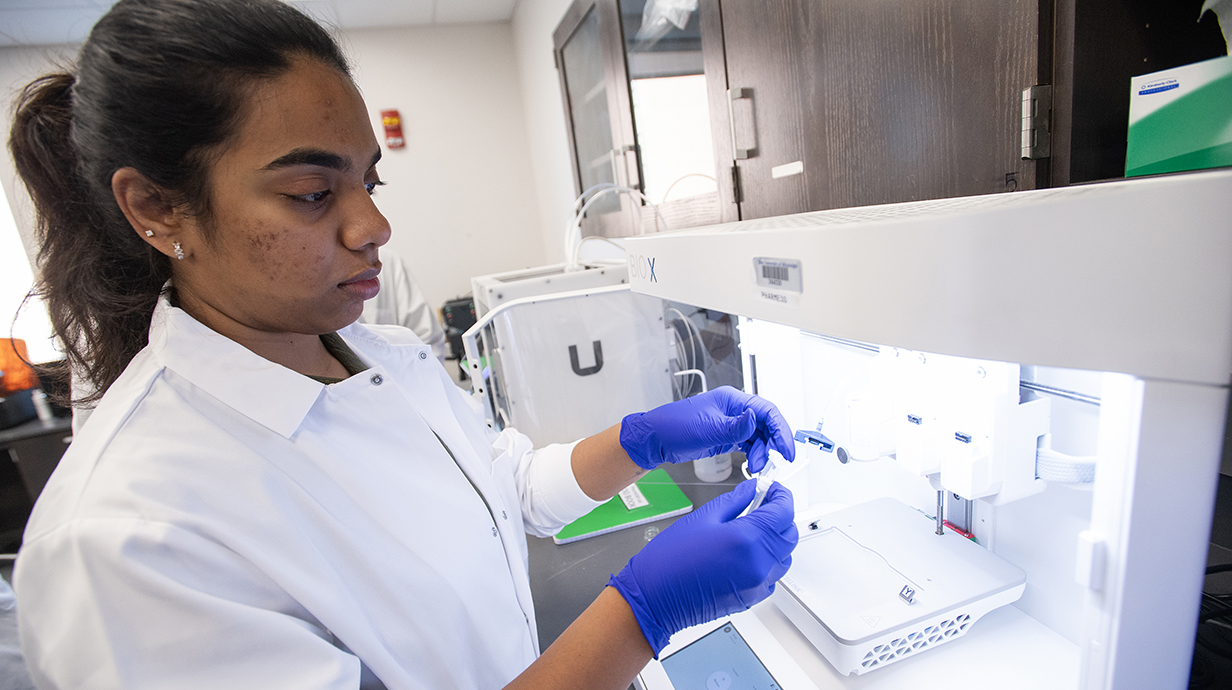
Navya Nalajala a first-year doctoral student in pharmaceutical sciences, works with a 3D SMART printer in Mo Maniruzzaman's lab. Photo by Thomas Graning/Ole Miss Digital Imaging Services
"This technology has the potential to further investigate the complex mechanisms between different types of vaccines and infectious diseases, like COVID and flu, and inform treatment mechanisms."
Maniruzzaman hopes to use SMART to produce polymeric microcarriers – tiny polymer beads that contain bioengineered one-cell organisms, such as yeast or bacteria, into the body. This method offers precise control over the shape and size of the beads to ensure they deliver the vaccine or protein therapeutics where they are needed.
These bioengineered microorganisms will also be capable of producing a range of small-molecule drugs as well as biological medical products, or biologics, such as proteins, antibodies and enzymes, in addition to recombinant protein vaccines.
The technology also could help significantly improve access to vaccines in remote areas where getting them in a timely manner is difficult.
The SMART technology has the potential to improve flexibility, cost and efficiency in manufacturing processes for protein-based biologics that can be used against emerging infectious diseases. It would also mean lower costs to both the consumer and the manufacturer.
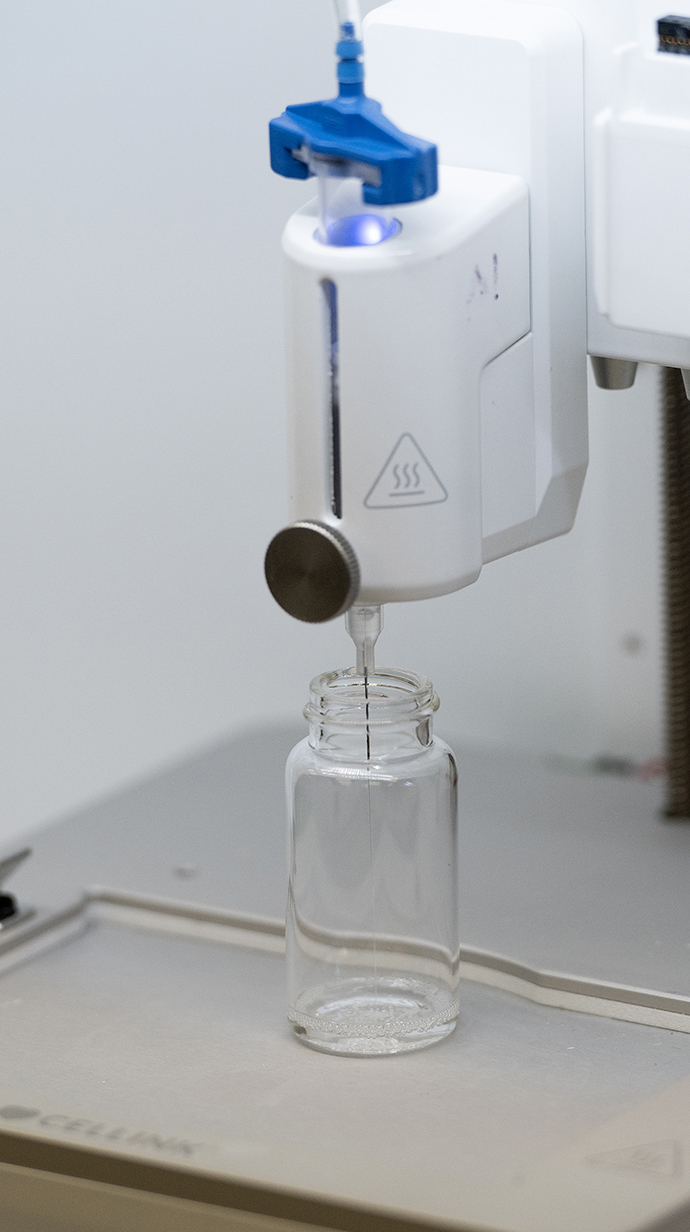
A 3D SMART printer deposits tiny beads loaded with vaccine compounds into a vial in Maniruzzaman's lab. Photo by Thomas Graning/Ole Miss Digital Imaging Services
Maniruzzaman began working on this technology while working at the University of Texas. The FDA provided roughly the same funding for his work there, also under the Research Project Grant program.
In recent studies, he and his Ole Miss research team have successfully used the SMART platform to streamline the production and study of how efficiently plasmid DNA demonstrates a response to cancer cells. The results indicate the consistency of the team's technology and potential usage in commercial applications.
"By the end of this project, we envision to develop a state-of-the-art streamlined technology to produce recombinant protein vaccines in a single step and at the point of service," he said. "There's a growing need for distributed manufacturing of biologics-based therapeutics across the world and results obtained from our research will get us one step closer to meet that need.
"This work will also form a strong background for our ongoing efforts of producing mRNA vaccines and therapeutics on demand."
This project is supported by the Food and Drug Administration of the U.S. Department of Health and Human Services as part of a financial assistance award 7R01FD007456-04 totaling $498,119 with 100% funded by the FDA/HHS. The contents are those of the author(s) and do not necessarily represent the official views of, nor an endorsement, by the FDA/HHS or the U.S. government.
See more photos from Mo Maniruzzaman's vaccine technology project
By
Natalie Ehrhardt
Campus
Published
June 17, 2024

